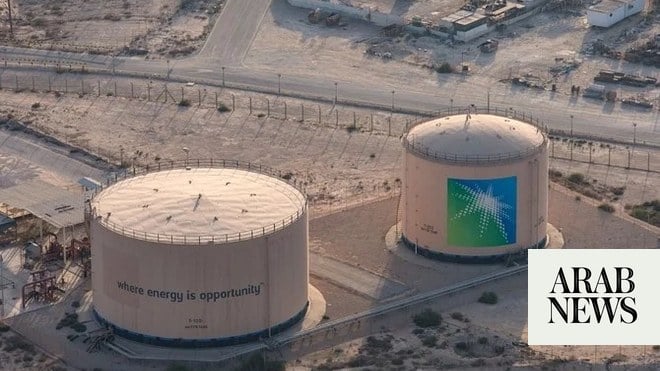RIYADH: Oil prices fell for a fourth day on Thursday on concerns that new COVID curbs in China, the world’s biggest crude importer, will impact fuel demand.
Brent crude futures fell 2 cents, or 0.02 percent, to $92.63 a barrel at 08.15 a.m. Saudi time.
US West Texas Intermediate crude futures were down 6 cents at $85.52 a barrel.
Brent prices have dropped more than 6 percent so far this week, while WTI is down more than 7 percent.
Saudi Aramco to ship full oil contract volumes to Asia in December
Saudi Aramco has told at least four refinery customers in North Asia they will receive full contract volumes of crude oil in December, several sources with knowledge of the matter said on Thursday.
The producer is maintaining a steady supply to Asia despite the decision by the Organization of the Petroleum Exporting Countries and allies including Russia, known as OPEC+, to lower the group’s output target by 2 million barrels per day starting this month.
“People are scratching their heads to figure out when will the output cut be materialized, as the market has not felt a tightened supply,” said one of the sources, a Singapore-based trader.
Saudi Arabia’s Energy Minister Abdulaziz bin Salman said when the cuts were announced in October that the actual supply cut would be about 1 million to 1.1 million bpd.
The sources said Saudi Arabia’s latest official selling prices to Asian buyers have sent a signal that it will not trim the allocation for the month.
Saudi Aramco lowered the December OSP for its flagship Arab Light crude it sells to Asia by 40 cents a barrel from the prior month amid signs of weaker demand in the region.
But the company raised the OSPs to European customers and kept the prices for clients in the United States unchanged.
Sanctioned oil tanker floating free after stranding in Indonesia
US-sanctioned oil supertanker Young Yong is moving away from shallow waters in Indonesia after more tugboats were deployed on Thursday to free the stranded vessel, shipping data showed.
The ten tugboats that had surrounded the ship were also dispersing, data on Refinitiv Eikon and MarineTraffic website showed.
On Refinitiv Eikon, Young Yong’s status has been changed to “restricted maneuverability” from “aground,” which would indicate the vessel is floating but that the crew does not have full control of the vessel.
The US has allowed some transactions necessary to dock and anchor the Young Yong safely and make repairs as part of the efforts to free the vessel. The supertanker ran aground off Indonesia’s Riau Islands on Oct. 26 near a gas pipeline. It had been heading to Nipah, a ship-to-ship transfer hub.
The US last week issued sanctions against an international oil smuggling network it said supports Hezbollah and Iran’s elite Quds Force, targeting dozens of people, companies and tankers as Washington sought to increase pressure on Tehran.
The Young Yong was among the vessels sanctioned through its ownership.
The supertanker is filled with about 2 million barrels of Venezuelan fuel oil after receiving the cargo through ship-to-ship operations last month, according to vessel monitoring services.
Oil producer Ithaca shares sink in UK’s largest IPO of 2022
Ithaca Energy made a lackluster debut in London on Wednesday as the North Sea oil and gas producer defied volatile markets with Britain’s largest initial public offering of 2022.
As Europe’s fifth biggest IPO of the year began trading, Ithaca’s shares fell as much as 11.6 percent below their 250 pence issue price, touching a low of 221 pence shortly after midday.
Ithaca’s IPO, which was priced at the bottom of the expected price range, gave the company an initial valuation of 2.45 billion pounds ($2.83 billion). At the top of the original price range, it would have been valued at 3.1 billion pounds.
(With input from Reuters)



